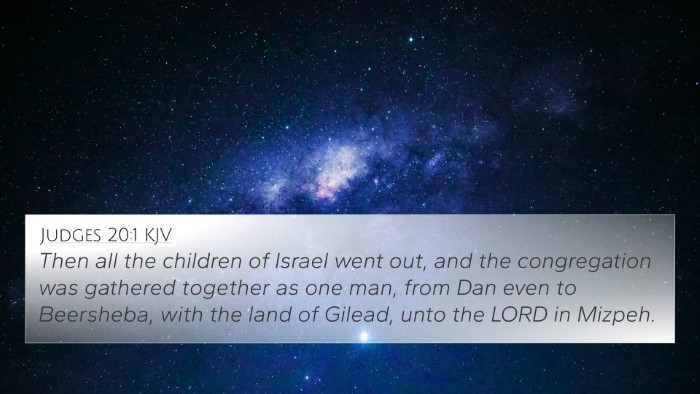Understanding Nehemiah 11:27
Verse: Nehemiah 11:27
Nehemiah 11:27 is a part of the historical account detailing the repopulation of Jerusalem after the Babylonian exile. Within its context, it emphasizes the commitment of the people to restore and rebuild the city and its spiritual community.
Commentary Insights
This verse reveals the importance of communal involvement in the spiritual and physical rebuilding of Jerusalem. According to Matthew Henry, this section showcases the tribes and families that were willing to settle in the city, demonstrating the strength of communal faith and action.
Albert Barnes notes that the specific mention of towns highlights the strategic importance of these locations in enhancing the city's secularity and fortifying its community. The people’s choice to inhabit these locations reflects their dedication to God and the covenant made by the nation.
Adam Clarke elaborates that the reestablishment of these communities was vital not only for physical repopulation but also for maintaining religious practices and upholding the worship of Yahweh in Jerusalem.
Key Themes and Connections
Nehemiah 11:27 contains several thematic elements that resonate throughout the Scriptures:
- Community Commitment: Just as the people of Nehemiah's time banded together to restore Jerusalem, numerous Bible verses emphasize the significance of community in faith (e.g., Acts 2:44-47).
- Restoration and Renewal: The drive to rebuild reflects themes found in Zion Restoration in Isaiah 1:26 and Ezekiel 36:33-36.
- Divine Providence: The verse alludes to God’s provision, paralleled in Jeremiah 29:7, where the exiled people are encouraged to seek the welfare of the city.
- Faithful Leadership: Nehemiah’s role as a leader is reflected in Exodus 18:21-22, where wise counsel is imperative for community governance.
- Covenant Loyalty: The settling and responsibilities taken by the Israelites echo the covenantal language found in Deuteronomy 30:2.
Bible Verse Cross-References
Here are several relevant Bible verse cross-references that shed additional light on the themes within Nehemiah 11:27:
- Nehemiah 7:4 - Discusses the population and size of the city.
- Ezra 8:1-2 - Lists the families that returned from exile.
- Psalms 122:6-9 - Advocates for the welfare of Jerusalem.
- Isaiah 54:3 - Promises expansion for the reinstated inhabitants of Zion.
- Acts 15:14-17 - Alludes to the rebuilding of David’s fallen tent, paralleling the restoration of community.
- Joel 3:1-2 - Highlights the gathering of God's people from all nations for restoration.
- Zechariah 1:17 - Declares that God has chosen Jerusalem again.
Thematic Connections Between Bible Verses
The restructuring of Jerusalem in Nehemiah 11:27 is rich in inter-Biblical dialogue. The act of restoration emphasizes similar themes found throughout Scripture:
- Faithfulness: The connection to Matthew 25:21 about being faithful in small things.
- Divine Guidance: Similar to Proverbs 3:5-6, wherein trust in the Lord is emphasized.
- Gathering of the Exiles: Parallels the theme in Matthew 24:31 where the elect are gathered from corners of the earth.
- Encouragement of the Spirit: Seen in Galatians 6:2, bearing one another’s burdens in community.
- Building on the Foundation: Reflected in 1 Corinthians 3:10-11, regarding Christ as the foundation.
Comparative Bible Verse Analysis
In conducting a comparative Bible verse analysis, we can draw connections between Nehemiah 11:27 and other scriptural texts that reflect communal dedication and restoration.
- Romans 12:4-5 - The body of Christ is one, with each member serving its purpose, reflecting community unity.
- Hebrews 10:24-25 - Encourages believers not to forsake assembly, mutual encouragement linking with Nehemiah’s assembly effort.
- Micah 4:6-8 - Discusses the establishment of God’s kingdom and the gathering of people.
Conclusion
Nehemiah 11:27 provides deep insight into the historical and spiritual significance of community and restoration in the life of believers. By exploring the connections between Bible verses and employing tools for Bible cross-referencing, believers can gain a richer understanding of how God works through His people.
Understanding the complex inter-Biblical connections provides a robust framework for studying Scripture and encourages believers to engage in the communal aspects of faith, reflecting on both past histories and contemporary applications.







